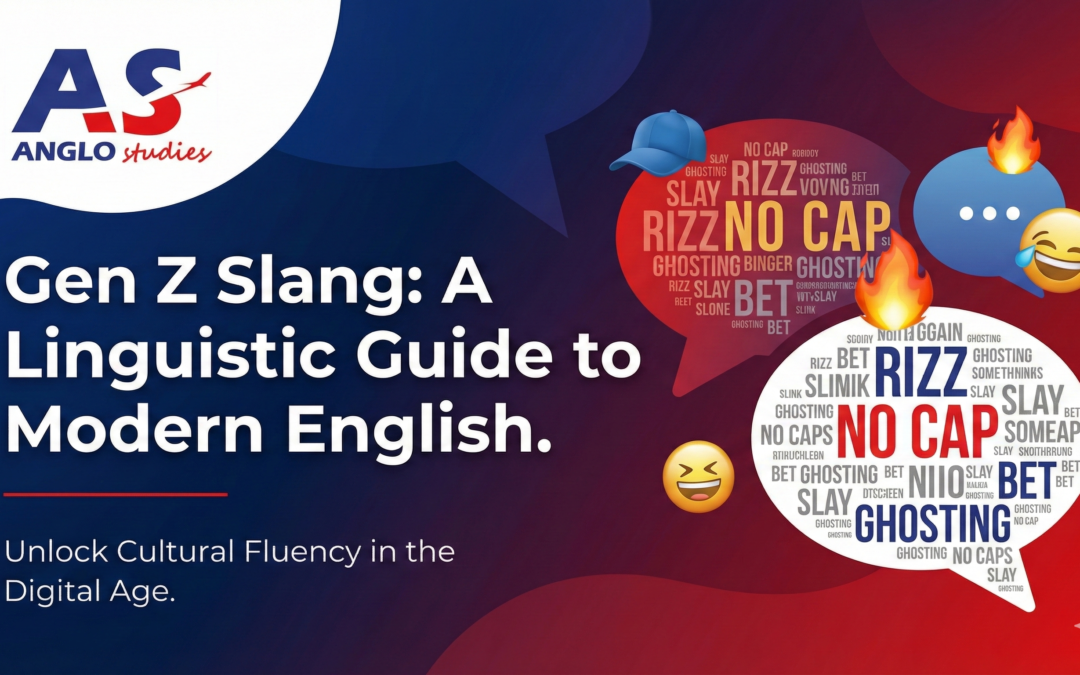Gen Z Slang: A Linguistic Guide to Modern English
Welcome to the chaotic, creative world of Gen Z linguistics—where words morph faster than TikTok trends and a single term can carry twelve different meanings depending on context, tone, and how many vowels you stretch out when saying it.
As language evolves, Gen Z has accelerated this process through digital platforms, creating a rich lexicon that blends African American Vernacular English (AAVE), internet culture, and delightfully ironic humor. Let’s decode the vocabulary that’s reshaping modern English.

The Gen Z Slang Words – Anglo Studies
The Core Vocabulary
No cap / Cap
Meaning: «No lie» / «That’s a lie»
Linguistic note: Derived from AAVE, «cap» as slang for lying has roots going back decades but exploded in mainstream usage around 2019. The phrase works as both assertion («no cap, that’s the best pizza») and accusation («you’re cappin’ right now»).
Slay
Meaning: To do something exceptionally well; to look amazing
Usage: «You slayed that presentation» or simply «Slay!» as encouragement
Cultural context: Originated in Black and LGBTQ+ ballroom culture, popularized by RuPaul’s Drag Race, now a universal term of excellence.
Bussin’
Meaning: Extremely good, typically used for food
Example: «This pasta is bussin'»
Linguistic evolution: Another AAVE term that went viral through social media, particularly through food review content.
Rizz
Meaning: Charisma, especially romantic charm
Etymology: Shortened from «charisma,» popularized by streamer Kai Cenat
Usage: «He’s got rizz» or as a verb: «rizzing up» someone means charming them
Fun fact: Oxford’s 2023 Word of the Year
Ate / Ate and left no crumbs
Meaning: Did something perfectly, with no room for criticism
Example: «She ate that dance routine and left no crumbs»
Linguistic pattern: Uses consumption metaphor for performance excellence
Vibes and Aesthetics
It’s giving…
Meaning: It has the vibe or aesthetic of…
Usage: «It’s giving main character energy» or «This outfit is giving 1990s»
Grammatical note: Innovative use of present continuous without an object, borrowed from AAVE syntax
Understood the assignment
Meaning: Exceeded expectations, nailed the task
Context: Originated from a 2021 viral post about Cardi B’s outfit, now applied to anyone who perfectly executed something
Main character
Meaning: Someone living confidently as if they’re the protagonist of their own story
Opposite: «NPC» (non-player character—someone without personality or agency)
That’s so demure, so mindful
Meaning: Modest, reserved, cutesy
Origin: Viral TikTok trend by Joolie Lebron, used both genuinely and ironically
The Negative Spectrum
Cringe
Meaning: Embarrassing, awkward, uncomfortable (adjective, noun, and verb)
Linguistic shift: Evolved from visceral reaction word to catch-all criticism of anything uncool
Mid
Meaning: Mediocre, average, not impressive
Usage: «That movie was mid»
Cultural note: The ultimate Gen Z insult is not calling something bad, but unremarkable
Ick / The ick
Meaning: A sudden turn-off or feeling of disgust, usually in dating
Example: «I got the ick when he was rude to the waiter»
Red flag / Green flag
Meaning: Warning sign of problematic behavior / Sign of positive traits
Linguistic function: Borrowed from literal warning systems, now applied to relationships and character assessment
Social Commentary Terms
OK Boomer
Meaning: Dismissive response to outdated or condescending views
Sociolinguistic significance: Generational linguistic warfare distilled into two words
Gaslight, Gatekeep, Girlboss
Meaning: Satirical triad mocking toxic workplace feminism
Context: Started as genuine corporate feminism, became ironic commentary on performative empowerment
Touch grass
Meaning: Suggestion that someone spend less time online and reconnect with reality
Usage: «You need to touch grass» = you’re too chronically online
Chronically online
Meaning: Someone whose worldview is shaped entirely by internet culture, often disconnected from reality
Intensifiers and Reactions
Lowkey / Highkey
Meaning: Somewhat, secretly / Obviously, very much
Example: «I’m lowkey tired» (a little) vs. «I’m highkey starving» (extremely)
Bet
Meaning: Agreement, confirmation («sounds good,» «okay»)
Usage: «Want to meet at 7?» «Bet.»
Say less
Meaning: «I understand, no need to explain further»
Function: Efficient communication that shows you’re on the same wavelength
Sheesh
Meaning: Expression of excitement, disbelief, or admiration
Pronunciation note: Often drawn out («Sheeeeesh») with a specific intonation pattern
The Linguistic Patterns
What makes Gen Z slang fascinating from a linguistic perspective:
- AAVE Integration: Many terms originated in Black communities and spread through hip-hop and social media
- Semantic Broadening: Words rapidly expand meaning (e.g., «slay» went from one context to universal praise)
- Irony Layers: Terms can be used genuinely, ironically, or post-ironically simultaneously
- Compression: Language efficiency for fast-moving digital platforms
- Visual Components: Many terms work best with facial expressions, gestures, or emojis
A Word of Caution
While it’s valuable to understand these terms, remember that language carries cultural weight. Many Gen Z slang terms originate from AAVE and have been used in Black communities for years or decades before going viral. Using these terms thoughtfully means acknowledging their origins and not treating them as disposable trends.
The Bottom Line: Gen Z slang isn’t just random internet nonsense—it’s a sophisticated linguistic system that serves the communication needs of a generation navigating rapid technological change, social awareness, and a desire for authentic expression. Whether you think it slays or it’s giving cringe, one thing’s for sure: it’s reshaping English in real time.
No cap.
What Gen Z terms have caught your attention? Reply with your favorites or the ones that completely baffle you. We’re lowkey curious.


Comentarios recientes